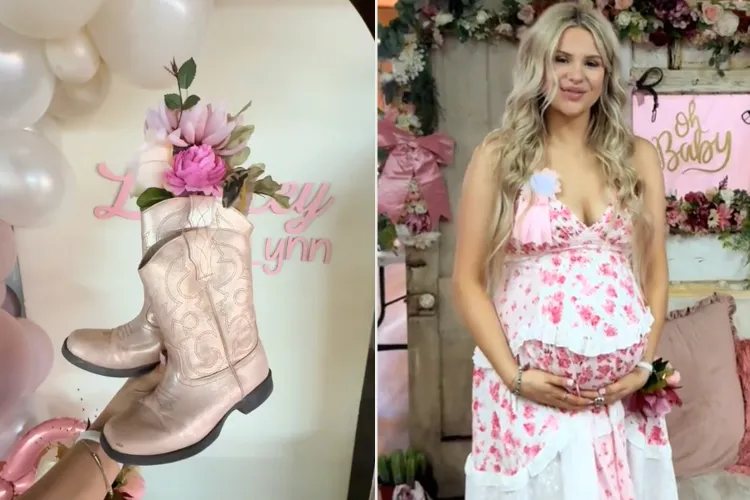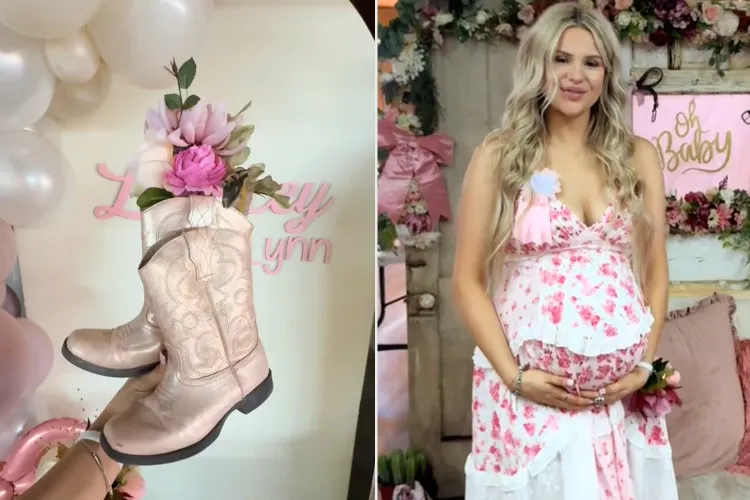TikTok Mom Kailee Zak Reveals She’s Naming Her Baby Girl Lukacey Lynn After Her Beloved Lucchese Cowboy Boots, and the Internet Is Exploding
Here’s a story that blends personal reinvention, viral social-media moments and the age-old question of how we name the next generation. In a video posted this past October on TikTok, 20-something mom-to-be Kailee Zak stood in a pink-accented room, wearing a flowing maternity dress, cradling her growing baby bump. The camera panned from her hopeful face to a pair of pink cowboy boots and then to a large sign spelling out the name she and her partner had chosen for their unborn daughter. The name: Lukacey Lynn.

At first glance it might appear whimsical, even outrageous to some. But for Zak, the name carries far more than a cheeky nod to her favorite boots. It’s a declaration of self-rediscovery, a marker of identity and transformation. In her Instagram and TikTok posts, she explains that the boots, from the brand Lucchese, became a symbol of her reclaiming herself after an earlier chapter in life. She says she became a mother for the first time at 17, while still in high school, interrupted college plans and temporarily lost touch with who she believed she was.
As she moved into what she calls her “Western influencing era,” those boots became part of her personal brand. They weren’t just footwear: they were a reminder of rootedness in her Texas upbringing, of a younger woman rediscovering confidence through overnight viral style content and a community on social media. And now, as she waits for her daughter’s arrival, she has chosen to embed that symbolism into the baby’s name. “The most special name to us,” she wrote in the caption of her TikTok reveal.
Not everyone received the news with enthusiasm. The comments section exploded with a mix of shock, disbelief and critique. “What in the Renesmee,” one commenter wrote (a reference to the Twilight series). “A reminder we’re naming babies that will be adults,” wrote another. Some echoed concern over whether naming a child after a fashion item or brand carries consequences down the line.
Zak didn’t shy away from the reaction. In follow-up videos she addressed critics head on. She posted a montage of maternity photos under a caption that read: “Never thought naming my child Lukacey would stir up so much controversy… but anyways here’s some maternity photos content.” She added that the pushback only reinforced her conviction: “Everybody hating on her name just makes me love it even more… y’all realize there isn’t a thing y’all can say/comment that will ever make me not absolutely adore it.”
From a journalistic perspective this case raises two intertwined threads. On one side is the cultural dimension: parents today navigating influence from social media, branding, identity and aesthetic expression. On the other side is the timeless question: what does it mean to give a child a name, a lifelong label that intersects with who they become? In perhaps no era was that more visible than now, when TikTok reveals viewers of millions and viral baby-name announcements are already part of the media ecosystem.
For Zak, the boots speak to a journey. She said that after becoming a young mother at 17, she felt she had lost herself. In her words, “Being home with a baby and not going to college, I sort of lost myself a little bit and forgot who I was as a person.” The boots — once a fun accessory — became a tool of empowerment: wearing them, styling them, sharing videos of them. They represented a shift from writing “I’m a teenager who got pregnant” to “I am someone who chooses what I wear, what I represent.” In naming her daughter Lukacey, she makes that story part of her child’s legacy.
But critics ask: what of the child herself? A name is a lifelong burden and farewell to neutrality. Will Lukacey Lynn become a person defined by boots and branding or will she someday reject the symbolism her mother attached to her? Will her teenage self still embrace “Lukacey” the way her younger self might? These are neither trivial nor purely academic questions. Sociologists and child-development experts remind us that children grow into their names, into their identities, shaped by the context around them. When a name is unique—even manufactured—it can become a point of pride or difference, depending on how the child is supported.
To Zak’s credit, she is aware of the public nature of her choice. Her maternity announcements, baby-name videos and commentary have drawn thousands of views, tens of thousands of comments and posted reactions. She acknowledges that the “mixed” feelings extended beyond strangers online to her own family. “The second I shared it on TikTok, people started weighing in. My family had mixed feelings,” she told interviewers. The public aspect of naming, empowered by viral social-media platforms, means that what used to be a private family decision now becomes a spectacle of clicks and commentary.
Media outlets that covered the story—from mainstream entertainment publications to parenting blogs—took varied stances. Some treated it as a bizarre oddity, others a wake-up call for deeper reflection about naming trends in the influencer age. Meanwhile, her own stance remains firm: the name is hers to give, the story is hers to tell. And in a digital world where attention equals opportunity, she also noted that the commentary (positive or negative) brought more traction to her content, increasing engagement and visibility.
There is also an economic layer here. As Zak posts maternity-content, lifestyle reels and family-related posts, each viral moment amplifies her social-media reach. She openly mentioned how the surge of comments—some snarky, some supportive—has translated into more views, shares and monetizable interactions. In that sense, the naming announcement becomes less about a private decision and more about strategic content creation. That awareness doesn’t necessarily diminish her sincerity—she does speak of real emotional roots—but it does place the decision in the context of influencer dynamics: the fact that personal moments now become public, shaped in part by what performs.
Still, behind the screen and the boots lies a real pregnancy, a soon-to-arrive daughter, and a family navigating what comes next. Lukacey Lynn is more than a viral headline; she is a child who will grow, learn, make friends, face school, and negotiate how she is perceived. The name may draw attention, but what she becomes will depend less on boots and more on love, nurture and opportunity. Zak repeatedly emphasizes her excitement: “So excited for our girl to be here.”
In that sense, there is a balance to strike. The adult who names a child bears responsibility—not only for meaning, but for outcomes. As many commenters urged, every baby is first an adult in waiting. The vibrancy of that fact is often drowned by the spectacle of uniqueness. Naming a child after an accessory may feel playful or symbolic, but ultimately the child will live the name long after the boots have worn out. The public commentary—however harsh or humorous—is a reminder that naming is both personal and public, aesthetic and practical.
For everyday audiences, the story invites reflection rather than judgment. It asks: what values are we passing to children? When does personal identity become inherited identity? How much of our digital age is shaping what a name means? Zak’s decision, viral as it is, taps into that broader cultural shift. And whether one applauds or shakes their head, the result remains the same: Lukacey Lynn is en route to a world that will already have an opinion about her name. It falls to her family to ensure that whoever she becomes is grounded not by boots or viral videos, but by a secure sense of self.
As the weeks pass and Zak moves toward her due date, with maternity photos and social-media updates, the public will continue to watch. Some will remark on the novelty, others on the potential consequences. But for Zak, this is more than content—it is a personal chapter transformed into a baby’s name. In that lie risks and hopes. For the child, the name will become one more piece of identity to understand, to own or to reshape. And for the mother, the boots remain an emblem of a self she chose to honour. Whether others deem the choice wise or wild, the ultimate question will be answered in the years to come: how does Lukacey Lynn define herself?


